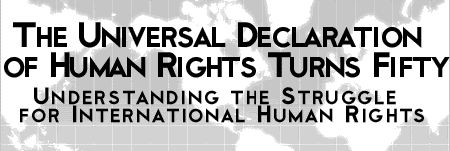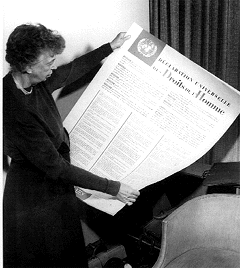SPRING 1998
Volume 15, Number 3

by Patrick Hutchins
On December 10, 1948, after months of backroom wrangling, late night work sessions, veiled
 |
|
|
Roosevelt was named U.S. representative to the U.N. Commission on Human Rights when it was formed in early 1948. Though loaded with some of the world’s most formidable philosophers and statesmen, the commission promptly elected her chairperson, testimony to her stature in the postwar era as First Lady of the World. While no doubt a crowning moment for a woman who moved in the highest circles of world power, the passage of the declaration was an even greater achievement for the world itself, just emerging from one of the greatest paroxysms of human abuse in history, World War II. Indeed, the declaration has been called one of the greatest steps forward in the process of global civilization.
Like other great political documents, the declaration is remarkable in both brevity and content, encompassing in a short preamble and thirty articles most of humanity’s hard-won ideals: the right to life, liberty and property; the right to remain free from torture; the right to a fair and public hearing; the right to remain free from servitude. The preamble recognizes that “the inherent dignity and the equal and inalienable rights of all members of the human family [are] the foundation of freedom, justice and peace in the world” and warns that “disregard and contempt for human rights have resulted in barbarous acts which have outraged the conscience of mankind.”
Documenting the Declaration

University of Montana history Professor Paul Lauren has chronicled the history of the Universal Declaration of Human Rights in a book that will be published later this year by the University of Pennsylvania Press. Years in the writing, The Evolution of International Human Rights: Visions Seen will be the first comprehensive account of the struggle to establish an agreement on human rights that was accepted by East and West, North and South, left and right.
Published on the golden anniversary of the declaration’s birth, the book is part of a worldwide celebration that will kick into high gear this fall. If Lauren finds himself at center stage, it is a role he is well-prepared to play. A distinguished scholar and former director of UM’s Mansfield Center, Lauren has taught at Stanford University and in England and New Zealand and lectured at the Smithsonian. One of the world’s leading authorities on international human rights, he has addressed the U.N. itself in Geneva. This is in addition to teaching at UM, where he is a Regents Professor and has received the Most Inspirational Faculty Member Award.
A Few Good Men and Women
At a recent talk in UM’s “Last Lecture” series - so named because teachers are invited to lecture as if it were their last chance at the podium - Lauren addressed the state of human rights in the world today. In this lecture - delivered without the safety net of notes - Lauren spoke candidly of a humanity that has much cause for despair. “Most people, in most times, in most places,” he said, “experience not human rights but human abuse.”
Despite this, Lauren remains hopeful because the same history also records efforts of people who made a difference in the face of overwhelming adversity. He outlined the three characteristics in these people. They were prepared to say they could make a difference. They faced vehement opposition, including torture and death, yet they persevered. And they were motivated by their own ethics to envision a world that didn’t exist at the time.
It is these “visions seen” that animate Lauren’s story of the Universal Declaration of Human Rights, from Eleanor Roosevelt’s dogged shepherding of the document when it was under attack from all sides, to the thousands of ordinary workers, women and children who wrote her letters during the summer of 1948, when the whole world caught the elusive scent of change for the better.
The Struggle Continues
Of course, declaration or no declaration, abuse is still rampant in the world fifty years later. But Lauren believes that because of the work and suffering of millions of ordinary people in the past, the abusers are less secure today. He points to the issue of national sovereignty. “In the past, states have always been able to claim that what they did to their own people was their own business,” he says. “The United States was a part of that system. That no longer carries the weight that it did. After the experience of the Holocaust, the international community argued that states were not going to be allowed to hide behind national sovereignty.”
Furthermore, says Lauren, “How states treat people at home is now regarded as an indication of how they will treat others abroad. Most of the world is convinced that it is indeed a legitimate threat to the peace and security of the world if there are serious violations of human rights at home.” Yet, he notes with sadness, it took the war and the Holocaust to make that point. And that, Lauren would no doubt say, is all the more reason why we all should be fierce in defending the declaration.
After his lecture, Lauren took questions from an audience of serious scholars, idealistic students and ex-sixties dreamers. What, one woman asked, did he think was the most important issue in international human rights today? Please, she seemed to be saying, of the numbing list of atrocities that our world has given us - the suppression of Chinese dissidents, the exploitation of children and women for cheap labor; the government-sponsored torture in Central America or Iraq, the oppression in East Timor, Tibet, Rwanda and India; the still-vigorous racism in our own country - tell me which one to worry about so I won’t drown in hopelessness.
“You have to decide for yourself,” Lauren told her. “But what I will tell you is this: If you immerse yourself in serving someone else, your world will be transformed.” M